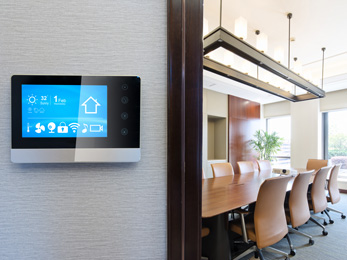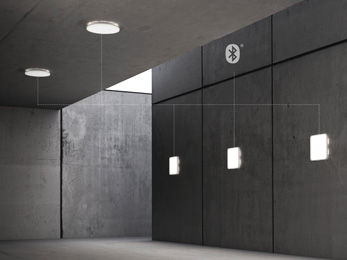Increasingly, autonomous systems are being used for building control: buildings integrate intelligent technology as well as the Internet of Things, breaking with conventional building management system structures. At the same time, they help to find solutions to problems, such as inefficiencies in the way buildings are used. One example here is analysing the amount of floor space actually required or the occupancy of meeting rooms.
In smart buildings, all systems are interconnected, from the air-conditioning system to security and lighting installations. Sensors, such as those detecting presence and counting persons, collect useful data on actual building capacity utilisation, remember given facts and work like a human organism’s sensory organs: benefiting from intelligent sensors, buildings perceive things (sense), process this (think), take appropriate action (act) and improve their abilities on the basis of this cycle (learn) – they start to behave autonomously.
Building management systems without stay-ON time

Heating, lighting and air-conditioning systems (HVAC) are often programmed for specific time slots, respond to movement or are switched on and off manually. A completely new dimension in building management is the ability to measure the exact number of persons in a room. This makes it possible to control HVAC systems even more closely in line with the needs of persons present – making stay-ON times redundant.
The building thinks for itself

Intelligent sensors not only make the use of floor space and energy more efficient but also improve other factors that enhance the general sense of well-being in a building. In this way, integrated temperature and humidity sensors optimise building management. This also include measuring CO2 and VOC (Volatile Organic Compounds). This ensures that CO2 does not reach excessive levels in a room and reduce concentration or that no unpleasant odours are produced.
Building Management 4.0

By enabling buildings to learn from us and adapt to us, we create an organism that harmonises human beings, the surrounding area and the environment. Unlike automation in smart-home environments, Building Intelligence not only makes our surroundings more comfortable and convenient but also provides real energy savings, in turn reducing costs.
Learn more about the benefits of Building Intelligence!

Energy and sustainability
Particularly in times of corporate social responsibility, entrepreneurs need to think about their approach to building management and how to conserve energy and the environment by playing an active part. Because buildings are still wasting too much energy.

Comfort and safety
Comfort and safety are things we have always associated with buildings. If a building knows where and how many people are present in a room, even if they are not moving, it is possible to devise whole new scenarios.